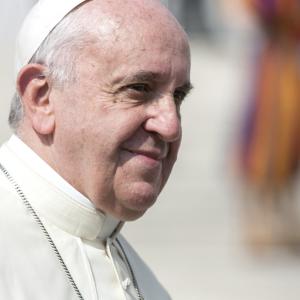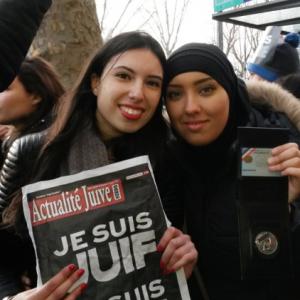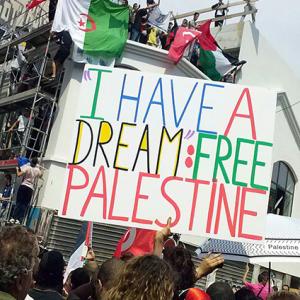Elizabeth Bryant writes for Religion News Service.
Posts By This Author
Archbishop Urges Iraqi Catholics to Stay and Help Rebuild
While the Iraqi conflict is far from over — a battle is now raging in the strategic city of Mosul, although government forces have gained ground against Islamic State militants — Mirkis focused many of his remarks on how to heal his deeply divided country.
Fighting Radicalization, France Wine Capital's New Taste
Across Europe, governments and local communities are searching for ways to counter extremism after a wave of largely homegrown terrorist attacks.The question is all the more important for France, the target of three terror strikes in two years, and Western Europe’s biggest exporter of extremist fighters.Yet while countries such as Britain, Denmark and Germany have long been involved in deradicalization efforts, France is a relative newcomer to such programs. Some believe the country’s fiercely secular mindset and conflicted relationship with Islam pose additional obstacles.
French Cardinal Accused of Cover-Up in Widening Abuse Scandal
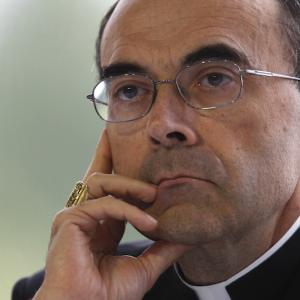
Cardinal Philippe Barbarin. Image via Reuters/Charles Platiau/RNS
French Prime Minister Manuel Valls called on a prominent cardinal to “assume his responsibilities” amid widening allegations of a pedophilia cover-up targeting Lyon’s Roman Catholic diocese. In an interview with BFM TV on March 15, Valls refused to comment on whether Cardinal Philippe Barbarin should step down. The archbishop of Lyon, Barbarin has been accused of covering up alleged sexual abuse of young boy scouts by Lyon priest Bernard Preynat between 1986 and 1991 — before Barbarin was named cardinal.
To Wear, or Not to Wear? French Jews Wrestle With the Yarmulke Amid Growing Fears

Image via REUTERS/Vincent Kessler/RNS
Claude Chiche doesn’t wear a skullcap, but he has strong opinions about them. “There are some here want to take off their kippah because they’re afraid,” said Tunisian-born Chiche, referring to the Hebrew word for yarmulke or skullcap. “But they shouldn’t accept this; they shouldn’t give in to fear.”
Anti-Semitism Spikes in France, Report Finds
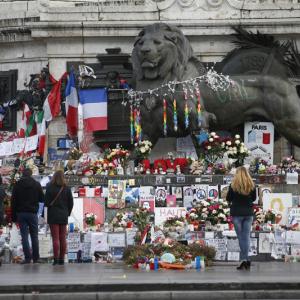
Image via REUTERS / Charles Platiau / RNS
As France marks the anniversary of the terrorist shootings that targeted a kosher supermarket and a satirical weekly, a new report warns anti-Semitism here continues to rise, taking a myriad of underreported forms.
“Violence targeting Jews and Jewish sites has led to a heightened sense of insecurity, and an increasing number of Jews are relocating in or outside France for security reasons,” U.S. advocacy group Human Rights First wrote in a report published Jan. 7.
After Attacks, Muslims in Paris Fear Being Targeted Anew
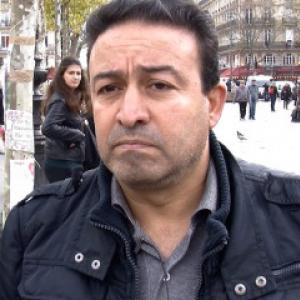
Image via Elizabeth Bryant / RNS
Shortly after the string of deadly, near-simultaneous attacks around the French capital, Faical Ouertani got a call from distraught friends in Tunisia.
“Their grandchildren were out celebrating a birthday,” the French Muslim said of two youngsters, also Muslims, who were shot by the assailants at a restaurant.
“They were probably among the first victims. Today, one is in the hospital; the other one is dead.”
Vatican Standoff with France Tests Pope’s ‘Who Am I to Judge?’ Stance
Pope Francis has been hailed for his forward thinking, but — at least according to French news reports — the pontiff has put on the brakes when it comes to a gay French ambassador at the Vatican.
In January, French President Francois Hollande nominated his protocol chief Laurent Stefanini as Vatican envoy to replace outgoing ambassador Bruno Joubert. The pick seemed ideal: 55-year-old Stefanini is described as brilliant and a devout Roman Catholic, who secured support for his candidacy from Cardinal Andre Vingt-Trois, the archbishop of Paris. He is also a known quantity at the Vatican, having served as first councillor to the Holy See a decade ago.
But so far, his nomination has gone nowhere. On April 22, France’s investigative weekly “Le Canard Enchaine” reported Pope Francis met with Stefanini last weekend. The message: The pontiff did not appreciate France’s 2013 same-sex marriage law, nor being pressured into accepting Stefanini’s candidacy.
French media report the standoff is due to Stefanini’s sexual orientation; France’s foreign ministry has only said his private life should be respected.
France Ponders Its Response to Shootings: Will Xenophobia or Multiculturalism Win?
As France emerges from its worst terrorist attack in decades, a biting novel that imagines the country governed by Islamic law is part of a swirling debate about its basic values. Will the country respond to the shootings with fear and xenophobia, as suggested by the book “Soumission,” or “Submission” — or embrace its multicultural, multifaith identity?
On Jan. 11, solidarity was on display as heads of state and religious leaders joined millions on the streets of Paris in a massive march for free expression and to honor last week’s victims from the satirical magazine Charlie Hebdo.
Along with “I am Charlie,” some protesters also chanted “I am Jewish” in tribute to the four men gunned down by one of the assailants at a kosher market.
Muslims carried signs saying, “I am Charlie and Muslim.” And on Twitter, thousands of French rallied behind “#JeSuisAhmed” — referring to policeman Ahmed Merabet, a Muslim, who also died in the attack on the magazine.
On the edge of the dense crowd, high school student Amina Tadjouri clasped a Jewish newspaper, as she stood next to a Muslim cleric railing against radical Islam.
“I’m Muslim, and I’m not OK with these killings,” she said.
Muslims on Edge after Paris Terrorist Attack on Satirical Magazine
A horrific attack on a satirical magazine that mocked Islam left 12 people dead on Jan. 7 and put the Muslim community on edge.
The hunt is now on for the assailants, two or three masked men who witnesses and police say opened fire with automatic weapons inside the office of French weekly Charlie Hebdo.
“People are exploiting this one way or another,” said Fateh Kimouche, 38, the founder of Al Kanz, a prominent French Muslim blog.
“The terrorists didn’t distinguish what faith their victims were from. … I just found out that one of the cops killed, his name was Ahmed. Even Muslims aren’t safe.”
The three gunmen who attacked the magazine during an editorial meeting reportedly shouted “Allahu Akbar,” and described themselves as al-Qaida in Yemen. They killed prominent cartoonists, staff members and two police officers in what French officials described as a carefully planned and executed attack.
The French weekly has drawn the ire of Muslims before. Its offices were firebombed in 2011, after a spoof issue skewering Muhammad, the Muslim prophet. A year later, the magazine published crude caricatures of Muhammad, shown naked and in sexual poses. Most Muslims object to any depictions of the prophet, even if reverent.
Reaction — and condemnation — was swift.
Political and Religious Leaders Denounce European Anti-Jewish Outbursts Tied to Gaza
Amid mounting protests in Europe against the Gaza conflict, political and religious leaders in the region have sharply denounced anti-Semitism within their borders.
“Anti-Semitic rhetoric and hostility against Jews, attacks on people of Jewish belief and synagogues have no place in our societies,” the foreign ministers of France, Germany, and Italy said in a statement Tuesday from Brussels.
Fears of escalating unrest are perhaps sharpest in France, home to Europe’s largest populations of Jews and Muslims. Many have roots in North Africa, and violence in the Middle East resonates strongly here. Thousands defied a government ban against Paris-area protests over the weekend, staging pro-Palestinian rallies that degenerated into violence.
French Jews Face Uncertain Future After Scandal
Amid a finance scandal that touched the heart of France’s Socialist government, a quieter drama played out this month as the country’s top rabbi resigned his post after admitting to plagiarism.
Rabbi Gilles Bernheim offered his apologies for “borrowing” the work of others and lying about his academic credentials, ending a leadership crisis that has rocked the country’s 600,000-strong Jewish community, the largest in Europe.
Now, as the search begins for a new grand rabbi, questions are mounting about which direction the religious leadership will take — notably whether it will continue Bernheim’s move toward a more “modern” and perhaps more inclusive French Judaism, or return to a more inward-looking faith.


